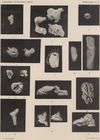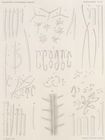 |
 |
|
|
||
Porifera taxon detailsMicroxina benedeni (Topsent, 1901)
166764 (urn:lsid:marinespecies.org:taxname:166764)
accepted
Species
Gelliodes benedeni Topsent, 1901 · unaccepted (genus transfer)
Gellius benedeni (Topsent, 1901) · unaccepted (genus transfer)
marine,
recent only
(of Gelliodes benedeni Topsent, 1901) Topsent, E. (1901). Spongiaires. Résultats du voyage du S.Y. ‘Belgica'en 1897-99 sous le commandement de A. de Gerlache de Gomery. <em>Expédition antarctique belge. Zoologie.</em> 4: 1-54, pls I-VI.
page(s): 16 [details] (of Gelliodes benedeni Topsent, 1901) Topsent, E. (1901). Notice préliminaire sur les éponges recueillies par l'Expédition Antarctique Belge. <em>Archives de Zoologie expérimentale et générale.</em> (3) 9 (Notes et Revue): v-xvi. (look up in IMIS) page(s): VII [details]
Type locality contained in Amundsen/Bellingshausen Sea
type locality contained in Amundsen/Bellingshausen Sea [from synonym] [view taxon] [details]
Taxonomy In the opinion of Göcke & Janussen (2013: 80), the differentiation between the species M. benedeni and M. charcoti seems...
Taxonomy In the opinion of Göcke & Janussen (2013: 80), the differentiation between the species M. benedeni and M. charcoti seems distinct enough to consider them as different species. This raises the question, whether the assignment of G. benedeni to Microxina is legitimate. The great similarity between the species’ characters, as pointed out by Burton (1932), might speak for a close relationship between these species, thus justifying the assignment to Microxina, although on the other hand the species fits quite well with the definition of Gelliodes as given by Desqueyroux-Faúndez and Valentine (2002). A solution to this question can only be found through a close look at the holotype. Still, it must be mentioned that if this species is to be assigned to Microxina, the definition of this genus, as given in Desqueyroux-Faúndez and Valentine (2002), has to be emended in the way that not only microxea, but also sigmas are present in Microxina. [details]
de Voogd, N.J.; Alvarez, B.; Boury-Esnault, N.; Cárdenas, P.; Díaz, M.-C.; Dohrmann, M.; Downey, R.; Goodwin, C.; Hajdu, E.; Hooper, J.N.A.; Kelly, M.; Klautau, M.; Lim, S.C.; Manconi, R.; Morrow, C.; Pinheiro, U.; Pisera, A.B.; Ríos, P.; Rützler, K.; Schönberg, C.; Turner, T.; Vacelet, J.; van Soest, R.W.M.; Xavier, J. (2024). World Porifera Database. Microxina benedeni (Topsent, 1901). Accessed at: https://marinespecies.org/porifera/porifera.php?p=taxdetails&id=166764 on 2024-04-23
Date action by 2005-07-10 18:05:41Z created db_admin
original description
(of Gelliodes benedeni Topsent, 1901) Topsent, E. (1901). Spongiaires. Résultats du voyage du S.Y. ‘Belgica'en 1897-99 sous le commandement de A. de Gerlache de Gomery. <em>Expédition antarctique belge. Zoologie.</em> 4: 1-54, pls I-VI.
page(s): 16 [details] original description (of Gelliodes benedeni Topsent, 1901) Topsent, E. (1901). Notice préliminaire sur les éponges recueillies par l'Expédition Antarctique Belge. <em>Archives de Zoologie expérimentale et générale.</em> (3) 9 (Notes et Revue): v-xvi. (look up in IMIS) page(s): VII [details] context source (Deepsea) Intergovernmental Oceanographic Commission (IOC) of UNESCO. The Ocean Biogeographic Information System (OBIS), available online at http://www.iobis.org/ [details] additional source Clarke, Andrew; Johnston, Nadine M. (2003). Antarctic marine benthic diversity. <em>Oceanography and Marine Biology: an Annual Review.</em> 41: 47-114. (look up in IMIS) [details] Available for editors additional source Burton, M. (1932). Sponges. <em>Discovery Reports.</em> 6: 237-392, pls 48-57. page(s): 271-272 [details] Available for editors additional source Burton, M. (1934). Sponges. Pp. 1-58, pls I-VIII. <em>In: Further Zoological Results of the Swedish Antarctic Expedition 1901-03 under the Direction of Dr. Otto Nordenskjöld.</em> 3 (2). (Norstedt & Söner: Stockholm). page(s): 11 [details] Available for editors additional source Desqueyroux, R. (1975). Esponjas (Porifera) de la region antartica chilena. <em>Cahiers de Biologie Marine.</em> 16 (1): 47-82. page(s): 73-74 [details] Available for editors additional source Koltun, V.M. (1964). Sponges of the Antarctic. 1 Tetraxonida and Cornacuspongida. Pp. 6-133, 443-448. <em>In: Pavlovskii, E.P., Andriyashev,A.P. & Ushakov, P.V. (Eds), Biological Reports of the Soviet Antarctic Expedition (1955-1958).</em> Akademya Nauk SSSR [English translation,1966, Israel Program for Scientific Translation]. page(s): 105(=106-107) [details] Available for editors additional source Koltun, V.M. (1976). Porifera - Part 1: Antarctic Sponges. <em>Report B.A.N.Z. Antarctic Research Expedition 1929-1931 (B, Zoology and Botany).</em> 5 (4): 153-198. page(s): 196 [details] Available for editors additional source Göcke, C.; Janussen, D. (2013). Demospongiae of ANT XXIV/2 (SYSTCO I) Expedition—Antarctic Eastern Weddell Sea. <em>Zootaxa.</em> 3692(1): 28-101., available online at http://www.mapress.com/zootaxa/2013/f/z03692p101f.pdf page(s): 78-80 [details] Available for editors additional source Campos, M.; Mothes, B.; Lerner, C.; Carraro, J.L.; Veitenheimer-Mendes, I.L. (2007). Sponges (Porifera, Demospongiae) from Bransfield Strait, off Joinville Island, collected by Brazilian Antarctic Program - PROANTAR. <i>in</i>: Custódio M.R., Lôbo-Hajdu G., Hajdu E., Muricy G. (eds) Porifera Research. Biodiversity, Innovation and Sustainability. Livros de Museu Nacional 28, Rio de Janeiro, pp 219-232. page(s): 228-229 [details] Available for editors additional source Schejter, L.; Cristobo, J.; Ríos, P. (2024). New records of demosponges (Porifera) from the South Orkney Islands (Antarctica) with a checklist for the region. <em>Zootaxa.</em> 5403(4): 401-430., available online at https://doi.org/10.11646/zootaxa.5403.4.1 page(s): 420 [details] Available for editors additional source (of Gelliodes benedeni Topsent, 1901) Burton, M. (1929). Porifera. Part II. Antarctic sponges. <em>British Antarctic ('Terra Nova') Expedition, 1910. Natural History Report, London, Zoology.</em> 6 (4): 393-458, pls I-V. page(s): 423 [details]  Present Present  Inaccurate Inaccurate  Introduced: alien Introduced: alien  Containing type locality Containing type locality
Unknown type (of Gelliodes benedeni Topsent, 1901) MNHN DT 1972, geounit Amundsen/Bellingshausen Sea [details]
From editor or global species database
Taxonomy In the opinion of Göcke & Janussen (2013: 80), the differentiation between the species M. benedeni and M. charcoti seems distinct enough to consider them as different species. This raises the question, whether the assignment of G. benedeni to Microxina is legitimate. The great similarity between the species’ characters, as pointed out by Burton (1932), might speak for a close relationship between these species, thus justifying the assignment to Microxina, although on the other hand the species fits quite well with the definition of Gelliodes as given by Desqueyroux-Faúndez and Valentine (2002). A solution to this question can only be found through a close look at the holotype. Still, it must be mentioned that if this species is to be assigned to Microxina, the definition of this genus, as given in Desqueyroux-Faúndez and Valentine (2002), has to be emended in the way that not only microxea, but also sigmas are present in Microxina. [details]
|

